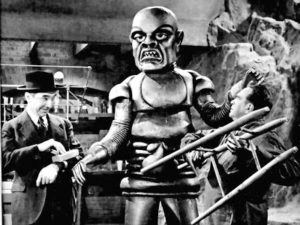My latest post in my column Veritas is about Love:
https://www.bizcatalyst360.com/i-am-in-love-with-you-a-unity-consciousness-perspective/
Here is the link to all my posted columns on Veritas:
My latest post in my column Veritas is about Love:
https://www.bizcatalyst360.com/i-am-in-love-with-you-a-unity-consciousness-perspective/
Here is the link to all my posted columns on Veritas:

The Phantom Creeps (1939)
Friends, family, and people who know me recognize that I am concerned about what is happening in our world. On my Amazon author bio page it states, “…strives to do his part to make our planet a wee bit better.” Writing a self-help book to help readers chart a course to better health seems consistent with doing my part to help make the planet incrementally better. But how does one do that in the context of a science fiction novel? More specifically, what does it mean to write a sci-fi story with an underlying intention of raising consciousness?
Calling attention to social issues is a mainstay of literature. Name any particular social ill and there are probably dozens of books exploring the issue in order to raise awareness. Examples abound but here are a few:
I did not focus on science fiction in the list above other than mentioning George Orwell’s 1984. The dystopian future and apocalyptic sub-genres often expose or somehow incorporate social messaging in their plots. Robot stories, and in particular those dealing with artificial intelligence, might call attention to the dangers of sentient AI. Erewhon, published way back in 1872, had three chapters titled, “The Book of the Machines”, in which Samuel Butler raised the issue of mechanical consciousness. Fast forward to today where movies such as Terminator raise the specter of AI dominance. Genetic engineering is another area explored as a social theme. Brave New World comes to mind. Examples in many of the other sci-fi sub-genres are plentiful.
I intentionally used a movie as one of my examples above. Often movies follow as book adaptations. One particular recent standout movie about corporate greed exploiting the mineral wealth of another planet in disregard to the technologically inferior indigenous species came as a movie first. Here I am talking about Avatar, a movie calling attention to these and other issues such as militarism and imperialism along with social justice.
This post is not meant to give a comprehensive overview of socially conscious science fiction in film and literature. I simply want to get you thinking about how these art forms incorporate social themes. Lets not lose sight of the fact that lots of great science fiction books and films do not include social messaging. Nothing against pure unmitigated entertainment, but I want my writing to convey something more. In this regard, I am trying to emulate one of the best sci-fi authors of all time, a man referred to as the “dean of science fiction writers”. Here I am referring to Robert Heinlein (of course); I dedicated Sentient to him in memoriam. The Wikipedia reference states:
Within the framework of his science-fiction stories, Heinlein repeatedly addressed certain social themes: the importance of individual liberty and self-reliance, the obligation individuals owe to their societies, the influence of organized religion on culture and government, and the tendency of society to repress nonconformist thought. He also speculated on the influence of space travel on human cultural practices.
What social themes am I raising in the novel Sentient? Isolation/separation and how this contributes to competition over cooperation, how we treat people with mental illness, and individualism vs. collectivism are just a few of the issues I touch upon. You would have to read the book or who knows, watch the movie someday (hey, a man can dream, right?) to get the complete gamut of social issues I am trying to raise awareness about. All of these enmesh in telling an engaging and thought provoking story. One of my beta readers said it all with the simple comment, “Great story! Somehow, I feel as though reading it has raised my consciousness.” Bullseye!
Enjoy this clip. What social issues does watching it call to mind?
[optin-cat id=”96″]
My first book has been translated into Danish and foreign distribution rights with St. Paul’s Better Yourself Books have been negotiated for India, Pakistan, the entire Indian subcontinent, and Nigeria. Worldwide the Integral approach to health is gaining acceptance. I had the distinct privilege to be invited by the ID Academy to speak in Denmark and give a series of workshops on Personal Growth and Transformation, the Life Skills Learning Series–Journey to Self-Transformation. Learn more about this course here: http://pathstohealth.info/appearancesworkshops/. Denmark is a great country and the people at the ID Academy are a wonderful group. Learn more about them and the fantastic offerings here: http://idacademy.dk/

English language version is available as an ebook and print version here: https://www.amazon.com/Pathways-Health-M-D-Victor-Acquista/dp/1935204947/ref=tmm_pap_swatch_0?_encoding=UTF8&qid=&sr=
[optin-cat id=”96″]

NARRATED AUDIO VERSION OF THIS POST
It is sometimes curious what provides inspiration for thoughts, musings, and instruction about life. We have all seen tropical fish in a tank. It might be as simple as a single goldfish in a bowl or something much more elaborate. Who among us has not wondered, at least momentarily, what living in such a confined space must be like? It seems a bit painful to watch a goldfish swimming around the confines of his/her world, looking out through the glass at a world he/she cannot enter. Is it so very different for us as we bump up against the barriers and boundaries that confine us and restrict us?
I have wondered from time to time, what thoughts and feelings might be swimming in the mind of the fish. Does it feel fear about the unknown which lies beyond? Or does it feel safe within the contained world that it knows? Does it feel anger about limitations that it cannot control or influence? Or acceptance in understanding that external control is an illusion after all?
At times, I contemplated moving fish to a bigger and more spacious tank. Surely it would be wonderful to move from a large bowl to a five gallon tank. Even better might be to go from five to ten gallons, or twenty-five, or fifty gallons. Why, that seems almost palatial! Yet, is it still not confining? Do the fish still not swim up to the glass and look outward? Are they truly less confined? Or are they simply living in a larger box of sorts, but a box none-the-less.
The answer seems to be that freedom comes from transferring the fish into a pond or a lake or a stream. But all of these are limited by banks, and shores, and cubic meters of water. None of these are unbounded. As a result, the freedom which seems present in such a large expanse for such a small fish is really just an illusion of freedom. The boundaries of even a very large box are still boundaries. How then can we be free?
True freedom comes with the recognition that it is not the external world but our internal world that limits us. Our imaginations represent an infinite wellspring of possibility, of potential, of creativity. We can go anywhere, do anything, be everywhere and nowhere, anytime, all the time without boundaries or restrictions using the power of our imagination. There are no limitations of time or space when we realize this. We are truly free and without limitation in this internal universe of possibility.
The boundaries and limitations both internal and external are indeed illusions. I like to imagine that the goldfish, swimming in the narrow confines of his/her bowl, knows this. I like to think that the goldfish is not bothered at all by the illusion of restriction, but does swim secure in the absolute certainty that it lives in unity with the infinite.
[optin-cat id=”96″]